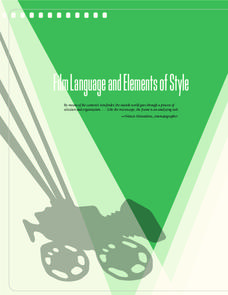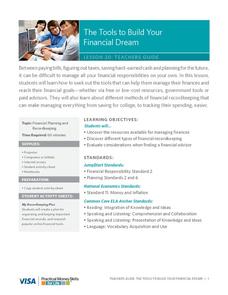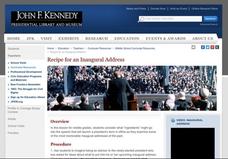School Improvement in Maryland
Types of Economic Systems
As an introduction to economics, government classes investigate different types of economic systems (traditional, command, market or capitalist, mixed) to determine answers to basic question about how goods are produced.
iCivics
Tribal Government: High School
Did you know there are 567 federally recognized American Indian and Native Alaskan tribes and villages in the United States alone? The resource helps break down the complexities of many different tribal societies to explain the concept...
Judicial Learning Center
Levels of the Federal Courts
The Supreme Court gets all the glory, but very few federal cases make it to the highest court. An interesting lesson explores the structure of the lower levels of the federal court system. In addition to outlining the organization of...
Curated OER
Lesson 4: The Judiciary: A Brief Introduction to the Courts System
Focusing on the judicial branch of government, the fourth lesson in this series explores the structure of the US courts system. Beginning with an engaging activity based on the short story The Lady or the Tiger, students go on to examine...
Judicial Learning Center
Types of Court Cases
How can one court acquit someone of a crime, while another convicts the person of the same one? It's all because of the differences between civil and criminal trials. An informative resource provides scholars in the field of criminology...
Judicial Learning Center
The Appeal Process
Why doesn't the Supreme Court hear testimony from witnesses? How do they complete an entire proceeding in less than two hours? A helpful lesson guides scholars of criminology through these and other questions by explaining how appeals...
Judicial Learning Center
About Federal Judges
Not just anybody can do the job of a federal judge, but according to the United States Constitution just about anybody can be appointed. The lesson outlines the process and requirements for becoming a federal judge, focusing on the...
Judicial Learning Center
The Judge and the Jury
Unless you are a lawyer, you might not understand just how unrealistic Law and Order and other legal dramas actually are. Here's a great resource to help scholars of criminology gain a more realistic perspective. The lesson outlines the...
School Improvement in Maryland
Political Systems: Advantages and Disadvantages
Every political system has advantages and disadvantages. To gain an understanding of these differences, groups investigate the political system of another country—oligarchy, monarchy, dictatorship, parliamentary—and prepare a...
Judicial Learning Center
State Courts vs. Federal Courts
Popular culture often portrays the Feds as the most fearsome of law enforcement agencies. Yet, someone charged with a crime is considerably more likely to end up in a state court. The lesson, one of six covering the Organization of the...
Film Foundation
Film Language and Elements of Style
How do you read a frame? How do you read a shot? Here's a resource that shows viewers how to read films. As part of the study, class members examine the camera angles, lighting, movement, and cinematic point of view in Mr. Smith Goes to...
Utah State Courts
Judges in the Classroom
Class members explore the process of a disposition hearing for juveniles, particularly looking at how the judge decides what sentence the juvenile offender should receive. Task your pupils with evaluating different sample cases provided...
School Improvement in Maryland
Court Proceedings Civil Cases
What's the difference between civil and criminal law? How do the court proceedings differ in these two types of trials? How do the standards of proof differ? Why do these differences exist? As part of their examination of the US court...
C-SPAN
Primary and Secondary Sources: Trailblazers in Congress
Trailblazers forge the path into uncharted territory, they establish a precedent for others to follow. Young historians research trailblazers in Congress using primary and secondary sources to profile outliers that changed the face of...
National Endowment for the Humanities
Revolution '67, Lesson 2: What Happened in July 1967? How Do We Know?
Even in a world in which dozens of participants and curious onlookers record every controversial event, the basic facts of what happened are often in dispute. Revolution '67, Lesson 2 explores 1967 Newark, New Jersey using an examination...
Equality and Human Rights Commission
Discrimination
Discrimination takes many forms, and lesson eight in the 12-part series addresses many types and their greater impact on society. The lesson uses a presentation, videos, news stories, and discussions to synthesize many different viewpoints.
Media Smarts
The Broadcast Project
As part of a unit on media studies, kids are asked to chart their viewing habits, observe the advertising that sponsors their favorite shows, and then to imagine what they would broadcast if given a block of airtime.
Visa
The Tools to Build Your Financial Dream
When it comes to all the ways money management and financial responsibility weave into our daily lives as adults, make sure students are prepared to locate resources for managing their finances, such as a financial advisor.
Big History Project
Human Migration Patterns II
While humans have always been on the move, the period between 1400 and 1800 saw vast migrations of people between the East and the West. These migrations—whether through slavery or a desire to colonize new lands—shaped the modern world....
Curated OER
Not Getting the News about the Stamp Act
How did American colonists react to the Stamp Act of 1765? Your young historians will examine primary source material by reading excerpts from a transcription of the Pennsylvania Gazette and then identifying the sentiments expressed by...
C-SPAN
Should States Shift to Mail-In Voting during the Coronavirus Pandemic?
With the coronavirus pausing many norms in American society, officials are trying to decide how to safely hold voting in the 2020 presidential election. Using curated video clips, including speeches from Congress, journalists, and...
John F. Kennedy Presidential Library & Museum
Recipe for an Inaugural Address
An inaugural address represents the first moments of a new beginning. Using John F. Kennedy's speech as a model for guided practice, groups examine the ingredients of an inaugural address. Individuals then repeat the analysis process...























